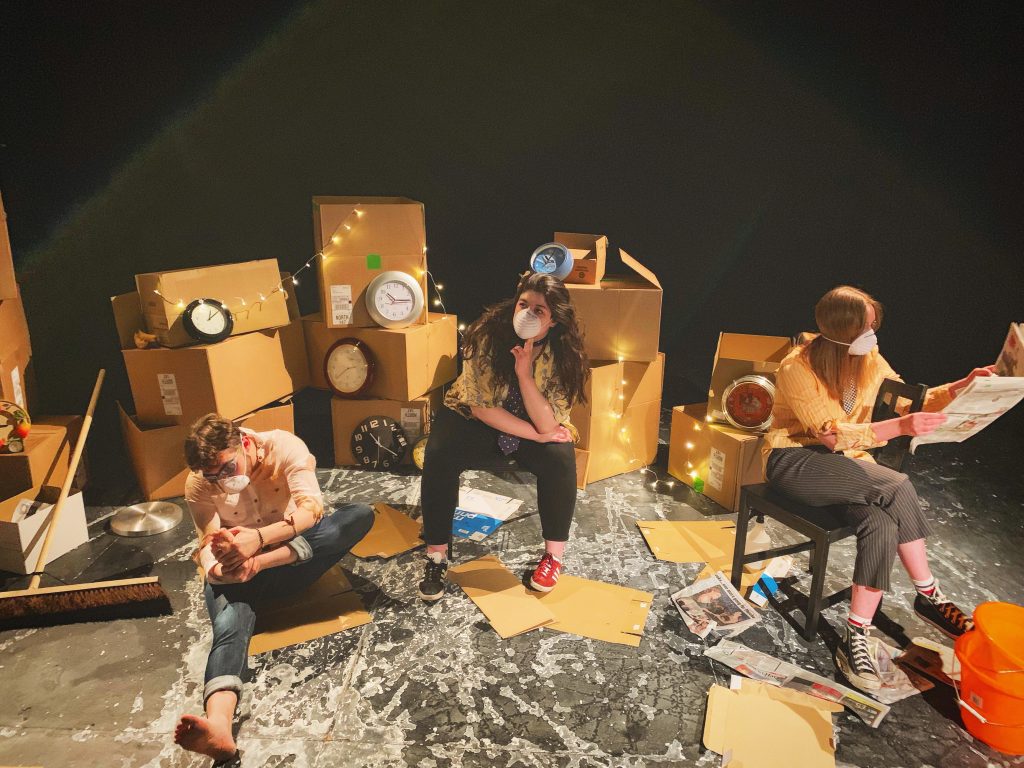
Catharsis is a devised performance in which I wrote and directed. I created it for my independent Practice and Research module in my final year at university, which combined knowledge from all the modules that I studied across my three years of University. The performance included many moments of physical comedy, which I endured from my clowning module ‘Funny Bones’ and the skill of writing comedy into a script using satire and wit from my comedy writing module ‘Funny Words’. This absurdist play follows three enemies as they explore Albert Camus’ 7 realms for human purpose as they prepare for the end of the world. This imaginative piece explores themes of human connection, boredom, and the uncertainty of existence.
The actor within me acknowledges my passion for performing and devising comedy, so when I had the opportunity to develop my own play I knew I wanted to create a response to the society I am growing up in, as a young theatre maker, in a satirical, playful tone. To quote Nell from Samuel Beckett’s Endgame (1957) “Nothing is funnier than unhappiness … it’s the most comical thing in the world.” The tragi-comedy genre allowed me to develop my artwork for audiences to find humour in and resonate with; everyone has experienced boredom, everyone has experienced friendship or lack of, everyone has once questioned their own mortality, and everyone has once purged their own emotions. I believe that there is a pure kind of joy that comes from real laughter, and I recognised that sometimes in life it is easier to just laugh at the world around you, rather than constantly trying to fix it.
Catharsis was the first play I created individually, holding complete control over the direction of which my production was going, which evidently was daunting. I adopted the roles of director, scriptwriter, stage manager, set designer, the lighting director.
Working on Catharsis allowed me to experiment with different approaches to theatre-making, drawing influence from artists and practitioners to find an approach to write, and direct my actors in an approach that worked for me. This included analysing the work of various absurdist playwrights; Harold Pinter, Eugene Ionesco, Jean Genet, Arthur Adamov to name a few, but the work of Samuel Beckett’s, in particular his play Waiting For Godot (1953), resonated with me and worked as a stimulus. The play is strong on its own merits, cultural zeitgeist aside. The kind of longevity and cultural impact Waiting For Godot portrays is what I as a playwright desire. The unpredictability of the end of mankind is mirrored by the unpredictability of events that happen in Catharsis.
I wanted to replicate this uncertainty for my characters, and also my audiences. When writing the script, I wanted the dialogue between these enemies to be illogical and irrational, to replicate how humans react when bored and waiting. I workshopped with my full freedom for them to do as they please, just as long as they stayed in their three designated positions. I gave them props; a banana, a pen and paper, and a newspaper. Watching them actually experience boredom, finding ways to entertain themselves with each other and the props given created humour, as it was genuine responses from how they felt. encouraging the element of play in the creative process felt a crucial part of writing comedy, as a lot of moments happened accidentally and gave an element of authenticity. Absurdity and comedy then began to come hand in hand by this point. There is something hilarious of the freedom of anything, or everything to happen. There is also something hilarious of absolutely nothing happening either.
Due to the episodic narrative, I felt at times it was difficult to have any form of development, and would at times suffer from ‘writers-block’, but working so closely with my cast imaginatively with no boundaries gained a strong relationship therefore was extremely effective. This being said, just because it was a structure that worked with this cast, it may not work with others. discipline varies in every rehearsal, so I acknowledge and I am prepared to adapt this accordingly to different cast members.
Whereas this was the final show as part of the module, and I was extremely proud of it; it is not the final product. I would love to keep developing and evolving Catharsis, re-imagining, re-staging, and re-writing for new audiences, different theatre spaces or different cast members.
One major development within the performance is the ability to move the performance from a studio space to alternative venues. I chose a non-traditional theatre space to reflect on the non-traditional theatre style. Performing Catharsis at SPARK: CIC works efficiently in one of my goals as an artist in making my work accessible for everyone, allowing new audiences to be emersed in theatre, that once would not before. In the future, I wish to take Catharsis on tour around the UK, for our society to experience to laugh, and to think.